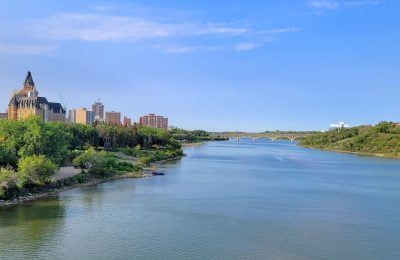
Taxi rides in some countries can be a form of adventure travel for Canadian tourists. (Julia Pelish/Vacay.ca)Traffic-jam-taxi
Story by Rod Charles
Vacay.ca Deputy Editor
A few years ago I was visiting my grandmother in St. Kitt’s and caught a taxi, or bus, with three relatives including a little cousin who was four at the time.
I can’t say for sure if our driver was drunk — I didn’t smell anything on him except body odour and halitosis — but he had the look of someone who was well acquainted with Mary Jane. His eyes were crossed, bloodshot and half-closed and he kept pulling up the loose snot in his nostrils with long, noisy, strained upward sniffs. There were no child seats in the car and only one set of working seatbelts, making for a bumpy, nerve-racking ride on the twisting roads of the Caribbean island. Of course, I didn’t realize any of this until I was in the car with him, and we were speeding from Bassetterre to my grandmother’s house in Half-Way-Tree at Mach Three.
As the taxi driver sped toward our destination, the usually beautiful coastline of St. Kitt’s became a nightmare. The car cut along the curves of the road as it whizzed by passing cars, a sure death on the jagged rocks below was only one mistake away. Thirteen kilometres of pant-crapping terror later, we arrived. Funny enough, I paid our driver, The Caribbean Cheech, without a word of complaint. Even funnier, my family jumped out of the car as if nothing had happened — just another day at the office for them. But not for me. I walked into the house with slow, measured steps feeling as lucky as a lottery winner.
Now to be clear, not all drivers in St. Kitt’s are unprofessional. But this particular one was and as I cooled down I had to reflect. This cab and its driver had they been operating anywhere in Canada, the United States or most European countries I would imagine, would have been shut down immediately. No seatbelts? Speeding? The driver possibly high? A rusty, wobbly poorly maintained car? No way would this man be able to operate a vehicle in Canada.
But this wasn’t Canada.
Brazil fire victims assumed they were safe. Why wouldn’t tourists?
Recently, a fire ripped through a club in Brazil, killing 233 people. Those college kids — most of them local — weren’t thinking about building and fire codes, clearly marked emergency exits, or bylaws regarding rules for lighting pyrotechnics in an enclosed space. All they were doing was going out to have a good time with their friends.
It’s too early to know exactly what happened without having all the facts. It’s possible an investigation may show that the club was nothing more than a building-version of a rusty, wobbly poorly maintained car. Or perhaps the club is a victim of an unforeseen outside influence — some have suggested an external flare may have caused the fire.
But I know this – accidents can happen anywhere, whether you’re staying in Canada or travelling abroad. Planes skid off runways and buildings catch fire. Concert stages collapse and car wrecks occur in developed and undeveloped nations. We suffer natural disasters and people die all the time because of accidents. In fact, the tragedy unfolding in Brazil is eerily similar to the Rhode Island Fire that killed 100 people in 2003. And don’t think the purpose of this article is to look down at everyone else. Living in Canada doesn’t make us immune to infrastructure and corruption issues — look at what’s happening in Montreal.
The difference is there are standards here that make living in Canada, the US, Australia and western Europe safer than many other places in the world. We have building codes, fire regulations and several levels of government agencies that can enforce these rules. In 2003, an earthquake in Haiti killed hundreds of thousands of people, including several Canadians. An earthquake of that magnitude would have been destructive in any city, but in a poor country without building codes, it’s even worse.
That means that if I decide to fly I have a certain level of confidence that the pilot has been trained properly and the plane has been looked over by licensed professionals and mechanical engineers before each flight. If I choose to go to a nightclub in Winnipeg or spend the evening in a hotel in Niagara Falls, I know there are strict rules for smoke alarms and a certain number of clearly marked obstruction-free exits that can mean the difference between life and death. If I was ever in a hotel in downtown Halifax during an earthquake, I feel confident that the structure will probably remain standing because it’s built to code. It means if I’m eating at a restaurant in Toronto, the chances are it’s been visited by a qualified health inspector several times during its existence.
And, for that matter, if I’m in a taxi in Fredericton, I know for a fact the driver won’t be high and driving a three-wheeled car with a giant hole under the passenger seat.
But what happens when we leave our country? Can you trust that the owner of the hostel you’re staying in hasn’t just paid off a corrupt official to look past the lack of smoke detectors in the building?
How do you know your service is safe when you travel?
The short answer — you don’t.
Let’s face it, if we had been visiting friends in Santa Maria, Brazil and they had offered to take us out dancing at their favourite club on the evening of January 26, would you have asked to go online to research the history of the Kiss Nightclub to see if they would be using pyrotechnics? If you catch a train in a foreign country, are you going to check to make sure that the rails have been properly inspected?
Of course you wouldn’t. You can’t. There’s a certain level of trust that we expect from proprietors and local governments.
But the lessons of Brazil might be that in at least some cases we can protect ourselves if we do our research and open our eyes to what’s around us. Certainly, there are things you can’t plan for. No amount of preparation would have helped you very much during the 2004 Indian Ocean earthquake and tsunami or the Mumbai attacks of 2008. But there are things that you can do to prepare yourself in case things do go wrong.
6 Travel Tips for Emergency Preparation
1. Register before you leave the country. Learn all that you can about where you’re going.
Always register with the Canadian government before you travel. Canada’s foreign consulates make it easy. All you have to do is visit this site for Canadians travelling abroad and follow the steps. According to the site, “Registration of Canadians Abroad is a free service offered by Foreign Affairs and International Trade Canada that keeps you connected to Canada in case of an emergency abroad, such as an earthquake or civil unrest, or an emergency at home.”
The Canadian government also has pages that are filled with essential information and health and safety advice. Canada also offers travel advisories that list up-to-date political and cultural information for any country that you wish to visit. By clicking on an individual country within the page you can get even more essential information about the country you’re planning to visit, including security, and law and culture information.
The US State Department has a good document that every traveller should read. Even though it’s written for American travellers, the information is good for anyone.
Another great way to learn about where you’re going is to read what the experts have to say. Vacay.ca has several travel experts including myself, Managing Editor Adrian Brijbassi, Karen Evenden, and Renee Sylvestre-Williams. Two words of advice: Wherever you choose to do your research, make sure the content — like the content found within Vacay.ca — is true journalism and not advertiser driven. You want to ensure you’re getting true, accurate and objective information before you plan your trip. And always read more than one opinion.
2. Research the services you’re going to be using
If you’re catching a flight on an airline that you aren’t familiar with, take the time to read about it online. You aren’t just a tourist you’re also a consumer, and that means you have the right to choose another way of travel if you don’t believe the airline is serious about safety.
Regarding airlines, CNN ran a terrific article by Marnie Hunter, called “How do you know your airline is safe?” This article is a good place to begin your research to see which airlines are safest. There’s also this list of airlines that are banned within the European Union.
3. Be aware of your surroundings
Going to an unfamiliar club or dance hall in a city you don’t know? There’s nothing wrong with that — heck, that’s half the fun. It’s impossible to check the safety history of a club in a city you’ve never been to before and besides — what are the odds of a catastrophic event taking place while you’re there? But if you’re with local friends, ask them about the club. Does it have a reputation for criminal activity? Is the area well policed? If you see red flags, consider going someplace else.
Also, know where you are in the club. Be clear where the exits are, and be aware of the kind of people who are in the club with you. Be alert. If it looks like the establishment has compromised on safety then find some place else to party.
4. Drink in moderation
While there’s nothing wrong with having a few drinks, be extremely careful about getting wasted in unknown environments whether it’s a club, dance hall, sporting event, festival, public square, it doesn’t matter. And always keep an eye on your drinks and valuables. That message isn’t just for women who must always be on guard for sexual assault – men are often victims of criminals who will drug, rob or hurt them.
This is probably the best advice a traveller can take anyway, because there are always predators lurking in the background looking for an easy, drunk mark – including unscrupulous taxi drivers. Staying sobre also puts you in a much better frame of mind to deal with a crisis, should it occur. It’s one thing to be a little tipsy, it’s quite another to be inebriated in a smoke-choked, panic-filled club.
5. Never compromise on safety
Buy food or accommodation on a shoestring budget if you need to. But don’t compromise on safety. Trust your gut. If you see something you don’t like about a service you’re considering using — windows in a hotel that are painted over, a dark club with only one partially blocked exit, filthy floors in a restaurant or an overcrowded bus that pickpockets just love — then don’t use the service. Walk if you have to. Eat somewhere else or go hungry for awhile. Find another way, even if it’s more expensive or inconvenient. If you don’t have a choice but to use that service, at least be alert.
In my case, it wouldn’t have hurt to have at least taken a look at that driver and the cab before I hopped in. Without question, there were other vehicles and more responsible, recently showered drivers in the area who would have given me a lovely ride home if only I had bothered to check. Lesson learned.
6. Avoid criminal activity
This one is pretty self explanatory. Nothing will land you in hot water faster than engaging in criminal activity. Avoid illegal drugs and stay away from weapons. A good rule of thumb — if it’s illegal here, it’s probably illegal there. Engage in criminal behaviour, at best you run a risk of getting scammed or worse, ending up in jail in a foreign country.
According to the Government of Canada, “Thousands of Canadians are imprisoned in foreign countries. Most of them are in the United States; the rest are in prisons in more than 85 other countries.”
Do yourself a favour — don’t become one of them.
Have fun, stay safe
We live in a world where accidents, natural disasters and crime happen. Bad things happen to good people everyday, despite the best precautions. But we can minimize the risk and protect ourselves if we remain diligent, open our eyes and trust our instincts. Enjoy the high that travelling brings but always, always be alert and have your feet firmly on the ground.
And on the issue of safety and security, never ever compromise.







